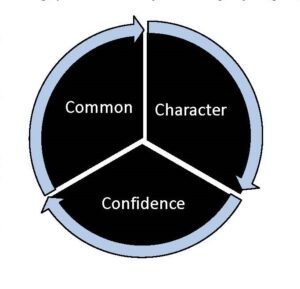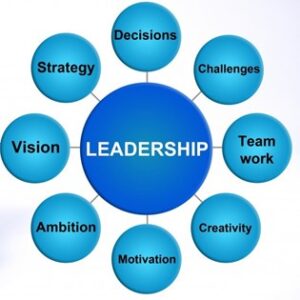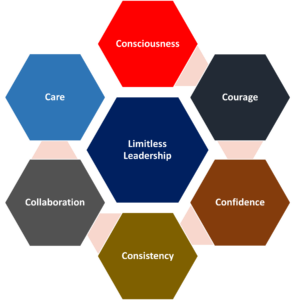Understanding Leadership
Leadership involves a whole range of skills, attributes, attitudes, traits and behaviour, which makes it almost impossible to have an all-encompassing definition of leadership. It is however worth noting that the root meaning of leadership is “Movement”, suggesting that the primary essence of leadership is to facilitate movement in a particular direction. In other words, a leader mobilizes, motivates or inspires people to move in a particular direction, mainly based on expressed vision, mission or goal.
True leadership therefore results when the ideals, ideas and actions of the leader match the needs and expectations of the follower(s). This holds true whether leadership is exerted in the Church, business, family, country or elsewhere. It is for this reason that the subject and theory of leadership has been studied, discussed and written about as a discipline for many years, and over will continue to be for many years to come.
The fact is that we are all affected by leadership, and every one of us is also called to exert one form of leadership or the other in our spheres of influence, be it at home or workplace. And, that is why leadership influence should be taken more seriously, because the influence of a leader can be both positive and negative. Therefore, every organizational leader must be ready to embrace the responsibility of leading people and work teams to achieve great results through continuous improved performance.
Primarily, leadership confers on a person the responsibility to rally people to focus on what is common to all in terms of purpose, builds their character as achievers and inspires confidence in them as winners. This is by directing their thinking and behaviour through the power of influence.
What this means is that effective leadership is only possible because of the investment made by the leader in building a trust relationship. Leadership is in this regard concerned with bridging expectation and achievement gaps. This is by fostering synergies, reinforcing behaviors and motivating people, particularly  through the skillful use of communication. The objective of leadership in each instance is to create the appropriate environment and conditions for development of mutual trust and confidence.
through the skillful use of communication. The objective of leadership in each instance is to create the appropriate environment and conditions for development of mutual trust and confidence.
A true leader must possess a clear sense of purpose and mission. He or she must be able to conceive a great and realistic vision, as well as possessing the capacity to remain focused on strategies to accomplish it. This of course demands that the leader is result-oriented, passionate about his mission, and committed to his leadership calling. And, because leadership is not a solo journey, a good leader gives time and priority to building partnerships and cooperative efforts with people that share his vision and optimism to achieve desired goals.
�
Leadership in the Rapidly Changing World
The world is changing rapidly, with many organizations struggling to keep up with the changes that are happening in their locations, and also far away from them in other countries and continents. Some of these changes are compelled by innovation, living conditions, technologies, consumer habits, globalization, competition, wars and conflicts, as well as governance and government policies, among others.
As a result, one of the greatest challenges of organizational leaders and corporate managers today is how to survive and thrive amidst the local and global changes. Achieving that goal on a sustainable basis is what determines effective leadership. Effective leadership thus defines the level of positive impact and influence that such leadership has on organizational development, growth, productivity, profitability and ultimately sustainability.
In this regard, effective leadership would be seen to manifest itself in the level of  mastery and efficiency of the leader(s) in enlisting the support of others, especially team members to accomplish tasks that create greater opportunities for enhanced people and organizational performance.
mastery and efficiency of the leader(s) in enlisting the support of others, especially team members to accomplish tasks that create greater opportunities for enhanced people and organizational performance.
The eight (8) organizational leadership issues of critical importance in this context are: ability to communicate realistic vision; development of workable strategies; good decision-making; overcoming challenges with optimism; facilitating teamwork; promoting creativity; motivating excellence; and driving personal ambitions. As a result, a successful and effective leader must consistently demonstrate the courage, competence, capability and confidence to challenge people towards the attainment of organizational goals. It is all about adapting the skills to inspire others to believe in, and work towards communicated vision and mission. That is the real influence.
But this is not exactly new, because over the years, powerful leaders have emerged in response to challenging situations. For example, the Biblical Joseph was positioned to wisely lead Egypt through years of famine, just as Moses was raised for the deliverance of Israel. In the same way, David came on the leadership stage to defeat giants and build giant killers. In more contemporary times, Nelson Mandela was able to lead a nation emerging from the dehumanizing apartheid era, in fostering the democratic South Africa as the “Rainbow Nation” where people of different races have equal rights.
It is no different within the corporate and organizational space. Truly impactful organizational leaders are those that have the charisma and character to effectively build and guide their organization through uncertain times, and ensure that their people remain focused, energized, motivated and productive to achieve lofty goals. Failure to achieve those goals spells disaster for the organization amid global and local volatility.
The Covid-19 global pandemic, which ravaged the world especially in 2020 and 2021, has irreversibly compelled new thinking, planning and operation for effective organizational leadership. For example, remote working, with less social interaction in the physical workplace has become the new normal, while the issues of personnel physical, mental and emotional wellness and have become more relevant in planning.
Limitless Leadership and the Power of Influence
With the rapidly changing and evolving world where the slightest global changes influence local conditions in faraway countries and continents, a new thinking of acquiring necessary adaptive leadership skills has emerged. This relates to the concept of agile and limitless leadership where leaders are nimble, proactive and flexible, with the capacity to confidently lead people or teams through uncertain times and situations.
Limitless leadership demonstrates the kind of leadership that the Lord, Jesus Christ typifies, and remains the greatest leadership model to influence people, and empower them to be the best versions of themselves. The core of limitless leadership in this regard is service, based on personal sacrifice and selflessness. This means that the limitless leader is conscious of core abilities, and is therefore focused on collaboration with others to create and build the energy of the team around his or her own.
The limitless leader is therefore ‘a dealer in hope’, ensuring that courage, confidence, consistency and care become the other key elements that bind the team together and facilitate trust and cohesion. So, the limitless leader never makes a decision without considering the impact of that decision on the followers. Not only that, the limitless leader is resilient enough to bounce back from adversity because of the focus on people and process, as the cornerstone of enhanced growth and best performance.
According to Tony Dovale, CEO of Lifemasters and Co-Founder of International Coaching and Mentoring Institute, “Limitless leadership is about honoring people, planet and profits to create exponential results that are sustainable and regenerative, with congruence of your motivations and aspirations of your team.”
The 6 Elements of Limitless Leadership (6C’s)
- Consciousness: Awareness of personal abilities, purpose, capacity, interests, strength, potential, values, dreams, desires, energy, and motivation.
- Courage: Ability to face and overcome challenges and the boldness to do the needful at all times irrespective of the dangers, having faith in the possibility to succeed.
- Confidence: Strong conviction and trust in personal ability to succeed at any task or endeavour despite challenges, owning to strength of competence and credibility.
- Consistency: Unfailing commitment, steadiness and reliability in behaviour and action, based on personal integrity, truth, trust and transparency.
- Collaboration: Open-mindedness to accept and adapt other people’s ideas and talents to create and add value, with skilful communication and conflict management.
- Care: Appreciation of each individual team member’s personal needs, with demonstrated empathy and compassion and responsive action in times of need.

Considering the above-listed elements of limitless leadership, how would you rate yourself? Would you rate yourself as a truly effective leader, agile and limitless leader? Remember in this regard that your effectiveness as an agile and limitless leader is dependent on how you successfully align people and your team around great ideals by inspiring and empowering them to be key stakeholders.
This underscores the fact that real leadership is everyone’s business. And, it is on this basis that the effectiveness of organizational leaders and executives will be determined. It is all about how they succeed in mobilizing their people, especially in facilitating the turning of their talents to treasures rather than suppressing great talents.
The fact is that people do their best when there is a chance to change the way things are done, as long as they will be improved through the process and experience. It is therefore the responsibility of truly effective leaders to seek every possible opportunity to strengthen others by sharing their vision, ideas, thoughts and needs. This is what gives the team members the power to be creative thinkers, in providing solutions. This is also what makes agile and limitless leaders to be effective leaders irrespective of the operating environment.
�
==============================================================
Dr Emmanuel Imevbore is an executive coach, management consultant and business strategist. He is the CEO of International Coaching and Mentoring Institute, a specialist coaching and coach-training Organisation. He can be reached by email:
emmanuel@ic-mi.com; and WhatsApp: +27 79 259 1768.
==============================================================



